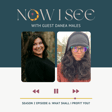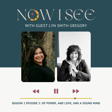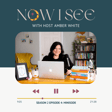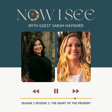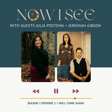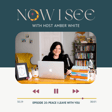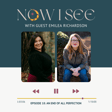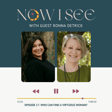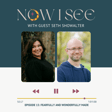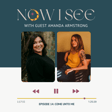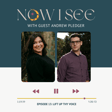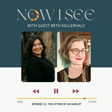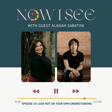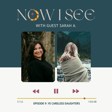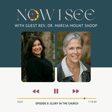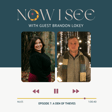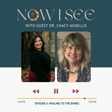Become a Creator today!Start creating today - Share your story with the world!
Start for free
00:00:00
00:00:01

The Wicked Conceals Violence: Domestic Abuse in a Primitive Baptist Upbringing with Maddy Usry
The title “Primitive Baptist” alone tells a story about the life today’s guest once lived. The ideals, beliefs about women and children, and inclination to lean on violence as a form of control are almost too backward to deserve the title.
In this episode, Maddy Usry shares her experience in this denomination, but more specifically about how it looked within her childhood home. Together, we also discuss the impact of domestic violence on women in extreme religious situations and how Maddy made the bold choice to make a new life for herself.
More from Maddy:
- Follow the “Raising Children Unfundamentalist” Facebook Group
- Listen to the “You Have Permission” Podcast
- Read “Good Inside: A Guide to Becoming the Parent You Want to Be”
- Read “What My Bones Know:A Memoir of Healing from Complex Trauma”
- Read “What Happened to You: Conversations on Trauma, Resilience, and Healing”
Domestic Violence Hotline
800-799-7233
Links:
Transcript
Introduction to 'Now I See' Podcast
00:00:01
Speaker
I was lost in utter darkness I was trapped in toxic shame I was bound by my religion Till I chose to break away
00:00:24
Speaker
Now I'm finding my true colors For the first time I feel free Now I'm learning self compassion And as I heal I'm finding peace
00:00:51
Speaker
Welcome to Now I See, eye-opening stories from the formerly faithful. I'm your host, Amber White, and here, me and my guests share our experiences in loving and leaving rigid faith systems. Together, we shine a light on the dark corners of these institutions and share the joys of rebuilding life on our own terms. I promise you'll leave inspired, even if you are a little teary-eyed.
00:01:23
Speaker
Hi, and welcome back to Now I See. I'm your host, Amber White, and today's episode is a heavy one.
Focus on Domestic Violence in Religious Contexts
00:01:33
Speaker
The bulk of the discussion will be focused on the impacts of domestic violence on women in extreme religious situations in particular. While we don't discuss any violent acts in detail, it is an in-depth conversation that bears some warning, especially if you're listening to it with children present.
Meet Maddie Yousri: Survivor and Advocate
00:01:54
Speaker
In this episode, I'm talking with my friend and former primitive Baptist church member, Maddie Yousri. Raised in a conservative homeschool fundamentalist family, Maddie has survived many forms of abuse and is working to break generational cycles and build her own family free from fear and violence. When she's not chasing her kiddo and pup, she enjoys book club, painting, and rewatching New Girl.
00:02:23
Speaker
Since leaving the cult she was raised in, Maddie has found love and light more abundant than ever in the care of her chosen and built family, in the strength of fellow survivors, and in the calm of nature. Maddie is passionate about hearing other stories and plans to pursue becoming a therapist in the coming years.
00:02:46
Speaker
Maddie's story is remarkable, and I hope it inspires you as much as it has inspired me. If hearing Maddie talk about her life now doesn't make you want to go and embrace yours to the fullest, I don't know what will. We mentioned resources a few times in this episode, so I have linked some of Maddie's recommendations in the show notes.
00:03:10
Speaker
I've also included the number for the domestic violence hotline. If you or someone you know is experiencing abuse, I hope you'll find it helpful to you. All right, let's get into the episode.
00:03:38
Speaker
Hi, Maddie. So nice to have you on the show today. I am really looking forward to this conversation with you because we have not had anyone on the show to talk about this particular experience yet, your experience. And I just, I think you have such a beautiful perspective on it and I love your heart around it and the work that you want to do in the world.
00:04:04
Speaker
in preventing things like this happening as much as possible in the future. So I'm very excited to have you to talk about that.
Maddie's Upbringing and Challenges in Primitive Baptist Community
00:04:13
Speaker
It's also nice. Maddie and I met through religious trauma group therapy, which is neat. So we've gotten to know each other a lot in ways that maybe most people don't know us. And that's really special. So I'm excited to have you here today. Thanks so much for having me, Amber. I'm so glad to be here.
00:04:32
Speaker
I'd love for you to start by telling your listeners what kind of religious experience you grew up in, what that was like for you, and just a little bit about the everyday life that you experienced as part of that. Sure. Wow. Where do you even begin? There's a lot of context there. Right. In some ways, we grew up really similarly, you and I,
00:04:58
Speaker
kind of that independent fundamentalist Baptist, though we had our own denomination title that they would have claimed, like, set us apart. We were so different, so unique, no one quite like us.
00:05:09
Speaker
It was primitive Baptist, right? Primitive Baptist, yeah. And some of the questions that come with that are so funny. Like, did you handle snakes? Did you have pews in your church? And no, we didn't handle snakes and we did have pews, but it was very old fashioned. No instruments, you know, really old kind of reformed theology. And then there was even our group where women wear head coverings in services.
00:05:41
Speaker
But yeah, so interesting little tidbit, you know, they're really similar. I was homeschooled like you were. I come from a somewhat large family. It's like a lot of those classic things, but there was also things that were unique to my story, like for my early childhood, my dad was in jail. And for all of my
00:06:08
Speaker
teen years, my mom was battling cancer. So there's things that play into my story that I think are different than maybe you grew up with. But when we talk about what we come from, it's really relatable.
00:06:25
Speaker
It really is. So can you talk to us a little bit about what your everyday life was like? What did it look like as a homeschooled young woman in your household with some of the doctrines that you grew up with about women and the beliefs that you had? I love that question because it's interesting to look back at how far I have come and how interesting that season of my life was. So it depends.
00:06:54
Speaker
what age we're talking, you know, my life looked a lot of different ways. But for the larger chunk of it, probably from age 11 on, um, I was very much on my own with schooling. Like occasionally there would be a resource for like outsourcing kind of a co-op situation or classes. Um, but a lot of the schoolwork was just almost self-paced and self-taught or there was an expectation and you just
00:07:24
Speaker
You do your work on your own. A lot of helping younger siblings and I have entire grades where I was the only person teaching my siblings and keeping up with their schooling.
00:07:38
Speaker
And definitely laundry, house chores, cooking, cleaning, all of those things. And I have an older sister who definitely partnered in that. And we split that load in some ways as what you would consider the traditional stay-at-home wife and mom. We kind of split that load in part because our mom was sick with cancer. And also, that was just the expectation for why you had
00:08:07
Speaker
children like I need more help to help me run my life and the boys and my family started working at the family business at a really young age and the girls ran the domestic life. Yeah. What were some of the beliefs around women and education that you experienced? Because I've heard you tell some interesting stories about that.
00:08:34
Speaker
Yeah, so I think that there is what you would hear from the pulpit, sorry, as like the official statement that that church would say, this is okay, that's not okay. And it was more of like an overarching theme. Like they would say women are to be, what was the term they used? Help meets.
00:08:56
Speaker
and you are, your whole life is heading towards marrying a man and giving word to his children, as many children as basically possible. Um, but my family also had like their own takes on things. Like I think there was internalized and overt misogyny that came out even more bluntly in my family.
00:09:26
Speaker
Um, you know, like my father saying things like the world was a better place before women were allowed to drive and have drive license, you know? And so that kind of called you like what we're working with. So college was not encouraged for anyone. Like there was this fear of a liberal agenda and being taught something that would make you stray from your faith. Right.
00:09:52
Speaker
But then I don't know of any examples before I went to college of women being allowed to go to college in my really tight circle, I would say. And if you did go to college, like for me, there was only so many approved majors. It had to be something that would make you a better wife and mother later. Interesting.
00:10:18
Speaker
Yeah. And working outside the house was just really frowned upon. And if I asked, you know, why it was like, you're not supposed to work under another man's authority. And I was like, well, what if I were a woman? Well, the woman's not supposed to be working outside the house anyway. Right. So like,
00:10:39
Speaker
All of that really serves to keep a woman stuck in that role and disempowered from making her own life choices, right? 100%. It's so interesting to me that even now in 2024 with everything
00:11:00
Speaker
we've been through and how much the world has changed and, you know, advancements in technology and access to information that this mentality can still thrive. Because that is how deep it goes. It really does. Yeah, it does. And there's still pockets. It's not like this is completely a thing of the past. There are still pockets of people
00:11:25
Speaker
that I know of who are operating with these same systems of keeping women oppressed. And I think that there are more overt ways it's happening in the world. Like she does get the degree and maybe work for a year, but then, um, he's really insistent that she raised the children at home and not work even part time. And you know, the name is not put on the house or the car or whatever. Like it's not,
00:11:53
Speaker
an equitable partnership and it is to where she does not have the option to leave and have like a sustained life outside of them. And I think that that is like still culturally happening, but just in like more covert ways probably. And maybe do these things, not even realizing that we're doing it. Like, you know, maybe the husband did not set out,
00:12:20
Speaker
to make sure she was stranded, but it's happening still in our world.
00:12:25
Speaker
It happens a lot. Yeah, it really does. And I think motherhood is a very good example of that. I think a lot of women end up feeling a little bit stranded in motherhood if they don't have really strong supportive communities. And, um, but I imagine that's even more true in situations like yours, because your options are limited to which way you're going to submit to whatever's happening to you, not whether or not you will.
00:12:55
Speaker
Right. And I think that's really an interesting thing to think about. You know, we were talking earlier before this about choices and realizing for the first time that you had some, because when you're in a situation like that, you don't have any you're, especially if you're still a child, your options are to take it.
00:13:18
Speaker
Yes. Yeah. And to try to minimize the impact to yourself as much as possible. And that's what your entire life is centered around. Right. Or centered on.
00:13:30
Speaker
And I just think it's, I hear a lot of people being like, well, those are choices and oh, you could have made different choices. And it's like, you don't even realize you have them in a situation like that because you are so disempowered from yourself, from your options in life and from having any amount of support to go and make a different choice. So you kind of get stuck. I think in that mode,
00:13:57
Speaker
That's so true. And I mean, the power structure in these systems is crippling for particularly children, girls, but then also women and mothers who particularly have more than one, you know, you're really limited in what you can do once you have these babies.
00:14:21
Speaker
And that is your heart and soul and you want to protect them and take care of them. In some ways, the only viable option you have left in these systems is to stay and take it. At least that's how it feels. Yeah, absolutely. And I think who's going to watch the kids if you did want to go to work, right? No one in your community is going to support you making a decision outside of your husband's umbrella of authority. So you can't rely on your,
00:14:48
Speaker
quote, community to help with that. If you wanted to pay someone to do it, where are you going to get the money? You're not working yet. You're not going to be able to use his money. So what are your options? Do you find work
Struggles in Leaving Oppressive Religious Environments
00:15:02
Speaker
and sneak off and pack up the kids and go like a job where you can take children with you? Like it just, you really are so stuck and it's hard to leave.
00:15:13
Speaker
when you don't have any options, what do you do? And I think there's also a fear element that comes in here because there are consequences to stepping out, right? There are consequences to speaking up. There are consequences to trying to change things. And I'd love it if you would touch on that a little bit about what that was like in your family.
00:15:38
Speaker
And we can touch on that John Piper quote that we've talked about a little bit too that drives us both insane. I think the threat is very real. It is not hypothetical. You know, we think of a religious structure and hypothetically, if you quote sin, God is mad at you and he may be punished.
00:16:00
Speaker
The consequences for being out of step in these structures are very real threats. So on the lower end of this, you might be looked at by your community in a judgmental way. You might have church elders need to meet with you or be concerned about you or check in and be judged or be little.
00:16:27
Speaker
very hurtful, but maybe I would say like on the lower end of the scale. But then there's other real consequences that I'm not sure what starts it. But I remember, um, like as a child, a threat being CPS, you know, like if you are doing this thing that makes me look bad in public, if you resist punishment that makes me look bad, or you tell people that, you know, you're being hit or something, then,
00:16:54
Speaker
CPS will come take you, destroy the family. You'll never get to see me again. There's like these kind of threats where your childhood don't know how CPS works and you don't have that formation. Um, and so of course you don't want to be taken from your family or if you're the wife in the scenario, I have heard it'd be weaponized against her. You've got to have your children under control and you've got to have them so disciplined and trained that when you go out,
00:17:21
Speaker
Someone's not going to call CPS on you or not taking the kid to the doctor when they have bruises and things like that. And we're not talking about as they felt down. There's a reason that there's a fear.
00:17:36
Speaker
being fed to them about CPS or things like that. But then also, I know these women, if they have an education, they've usually been out of the workplace since an entry-level job for years.
00:17:52
Speaker
Some of them don't have a credit score because they weren't put on the house, the car, the whatever. I know women don't know how much their husband's making. They don't have access to the finances. They don't know how much he spends. They are given a cash allowance for everything.
00:18:15
Speaker
And the consequences for stepping out of that, you are not going to potentially have a home in place for your child to go. You're not going to have resources for your child to be taken care of, for you to be able to have a job.
00:18:30
Speaker
You are are left with very few options and the options that you're left with are quite difficult and Painful to even make that jump like I'm going to go to a woman shelter Or you know this trusted friend and take it one thing at a time like that's very bleak so some of the threat is extremely real and
00:18:57
Speaker
There are even women that I believe are afraid that they will not be able to stay alive. Like their partner is too violent and the consequences would be too great if they left. And I think of T-11 from Shiny Happy People and how she knew that she had to get out and turns out like he did have a gun in the house and things like that. Unfortunately, that feels familiar to me. Yeah.
00:19:28
Speaker
Yeah. The, and you were in a very rural community too. Yes. So you probably had even more limited resources than someone who's closer to a city, um, who might have more, you know, organizations, nonprofits, things that might be able to help when you're that rural and disconnected infinitely harder.
00:19:53
Speaker
Um, but the threat of violence I think is that first threat that starts in childhood, right? And I mean, and we're talking more than spankings here. We're talking about horrific violence that's used to quote, keep you in line so that you
00:20:11
Speaker
behave and your family looks respectable, even though inside the home, it's it's anything but a respectable environment. And I think that's that is the scariest thing to know that the first fear is something that serious and then everything else piles up on top of that, making it harder to get out of that and to run away from that fear.
00:20:39
Speaker
But then there are consequences to getting away from that fear that are sometimes scarier than staying in it. Yes. And that's complicated. It's very complicated. And I think about the women that I loved and do love that haven't or didn't make it out of the situation that I did. And there are times when I feel
00:21:05
Speaker
you know, frustration and anger and hurt from them and their choices that kept me in this unsafe environment. And then there's also this lens of compassion that they were also a victim in this and that they had to make some choices that they felt like we're going to keep us alive.
00:21:29
Speaker
It kept us hurting and I can't play the tape out to the end and know for sure the alternate ending had we left. But I do know that that was never made to be a safe or viable option. It's not made safe by the church and I have found recently that it's not even made safe by the state of all times for women to leave.
00:21:55
Speaker
Yeah, let's talk about that a little bit because I learned this from you and it has blown my mind. Right, so I had heard stories that there was a time in my mom's life where she tried to leave and I believe that to be true and I believed the story was kind of pushed by our family and the
00:22:21
Speaker
church and homeschool group that God restored the marriage. Like it's so wonderful that this did not end in divorce, that God restored the marriage. And so there was even a point in time where my mother was asked to go around to homeschool groups, ladies' nights, church gatherings, and share her testimony of praying and begging God to change the heart of her husband and restore her marriage. And now he did it.
00:22:49
Speaker
and how good he was for restoring their marriage. And now that they had, depending on when she was given this talk, been married for 10 more years or 15 more years or more, some total 20 more years. And if you pull back the curtain, it was 20 years that were very fraught and what I now know to be abusive.
00:23:14
Speaker
And I just recently found out that this attempt to pursue divorce was actually very legitimate, that she had people offering resources to help fund this, let's make it happen. And she met with, I don't know if it was a lawyer or attorney, but a lawyer or attorney to start this process.
00:23:39
Speaker
and was denied because she was pregnant with me and you cannot get divorced when you are pregnant. Still today in seven states. Yeah. Yeah. And that is statistically one of the most vulnerable times for women in domestic violence situations is pregnancy because you're so vulnerable. Right. The most dangerous time for a woman is in leaving.
00:24:07
Speaker
And the average woman will try to leave nine times before she's successful. Nine times. Wow. The second most vulnerable time is when she is pregnant. And so for this, you know, cross section to be trying to leave and pregnant and these states saying, no, for child support purposes, we make you wait until you've had the baby.
00:24:35
Speaker
to pursue divorce, like they won't even open the case. And this has been true in some states, even in case of physical threat and violence, they will say to pursue a restraining order, but they will not start the process of divorce while pregnant.
00:24:59
Speaker
which blows my mind. It blows my mind to the fact that you lose your rights to safety because you're pregnant. Yes. And this is where I take a lot of issue with laws that are no exception laws. Right. Because it's a complicated world where very complicated things happen. And figuring out child support is nowhere near as important as helping someone keep their right to safety. Right. But no exceptions.
00:25:28
Speaker
Yeah, no, no exception. That's a blanket statement. And I am not even sure I agree with, um, the overall goal here of like, Oh, we need to pause for child support. Like that is small potatoes for a woman pregnant. Needing to get away from someone very low on the priority list, but who does it affect?
00:25:55
Speaker
Right. The men, right? The dad. It also affects the jobs of the people who are having to figure out that child support, who I imagine in a lot of these states are mostly men. And I think it's really interesting that when you have a system that's set up by, run by, managed by one group of people, and this is true not just for men and women, but for, you know, cis people for
00:26:25
Speaker
white people, there are lots of ways that when you monopolize a system like that, that's where we end up with oversight. Like we overlook, because if there were a handful of women sprinkled into that process early on, somebody would have mentioned that maybe there are going to be some times where safety is a problem, and if they had any amount of authority, it might be different.
00:26:51
Speaker
I am not sure that at this point some of our systems are not so deeply flawed that even a few women sprinkled in would, you know, raise enough flags and have warning bells for us to do something differently. Um, I do not think it is coincidental that per like career, like per job title that you look at domestic violence is one of the highest is in police families.
00:27:22
Speaker
It's over 40%, is it not? Right. I think so. And so if you are in this situation of needing safety, you know, like even just someone to physically get in between you and you pick up the phone and call the number we're supposed to call and someone showing up to your door has a bias.
00:27:41
Speaker
towards accepting violence or even enacting violence, I don't know that we can expect good outcomes. I don't think we can at all. The layers of protection that have to fail to get to that point. When I think about having some women in those positions, it would have had to have been from the start, right? It would have had to have been, or at least somewhere
00:28:06
Speaker
before now for there to be an impact on that. It's just another barrier that has been created for that leaving process. And I see that a lot when women are talking about being in domestic violence situations, like, why didn't you leave? It's like, there's a million reasons why someone doesn't leave. And there's a reason it takes nine times. It's not because she wasn't ready on the third time.
00:28:33
Speaker
It's probably a barrier and a really big one. 100%. And I think the tenacity to keep trying, like the fact that that number is nine is both heartbreaking and astounding.
00:28:46
Speaker
I think of women like my mom who attempted to change the cycle, to break the cycle in a big way, like divorce.
Systemic Biases and Control in Religious Communities
00:28:59
Speaker
And you finally get this courage up to do it. You are literally sick and heartbroken over the fact that this is your life. And the resources that you go to stop you.
00:29:11
Speaker
And I don't know that it's very common to then be able to do that over and over again until it finally works. Yeah. Is a lot of tenacity and strength, and it sounds worrisome and exhausting. Mm-hmm. And I'm sure that it is. And I think, too, I'm assuming here that you were in a culture that was not pro-birth control. Oh, 100. Yeah.
00:29:41
Speaker
you're going to continue to get stuck. It's going to get harder and harder the more kids there are. If you don't have any control over that. Right. It's really hard to run away when you're barefoot and pregnant and that is your thought. Yeah.
00:29:57
Speaker
Yeah, I'd love to talk a little bit about the doctrine of the religious community that you were in around this violence and kind of what women were taught about it, what men were taught about it, if you know, because I know they often separate out for things like that. But I'm just curious what you might have heard from the pulpit or from your religious community in general about violence in the home.
00:30:19
Speaker
Absolutely. I cannot remember in the church home that I grew up in, ever like outright hearing. This is a sermon on violence. But I do know, like we mentioned earlier, you know, John Piper
00:30:35
Speaker
who is respected by a lot of people and he was one of the approved resources that we could read or listen to or watch or go to their conferences outside of our denomination. It was like, oh, we disagree on a few things, but they've mostly got it right. He said years ago in an on-camera interview that
00:30:59
Speaker
Basically, it would be best for a woman to stay with a verbally abusive husband, even if she has to endure a quote, light smack for the night for a season.
00:31:13
Speaker
And so there was this idea that it was holiness and it was godliness for a woman to endure that and just try and win her husband over with sweetness was kind of the verbiage there, that you will win him over with your grace. And at one of the most violent points in my life,
00:31:42
Speaker
I was bought into this system and these beliefs and I was like, I'm going to go about pursuing help by their channels or recommended channels. So that elder within the church who was getting some kind of counseling degree, you know, I arranged this meeting and describe what is happening. And they're like, when they start raising their voice, you stand up and say, I will speak to you again when you're ready to lower your voice.
00:32:10
Speaker
And they're hearing this physical threat that I'm being met with and they're like way to advocate for myself is stand up and say, I will continue this conversation when you're ready to lower your voice. And that evening I, you know, got in the car after this counseling session and was told like, if you say anything that makes me look bad, that gets me in trouble, I will kill you.
00:32:40
Speaker
And I knew that if I kept pursuing, quote, like reconciliation in this way that the church was telling me to, that this was going to escalate. And that is not uncommon. And that is maybe even from a church elders perspective, a more gracious response to say, like, stand up for yourself.
00:33:05
Speaker
Because it's also common for them to be like, well, what did you do? What did you say that provoked this? Are you speaking with a, you know, sassy tone or being disrespectful in your words? And I know other people in our church that confided severe sexual abuse at the hands of a parent and they're called
00:33:28
Speaker
children make up crazy stories. The heart is deceitful and desperately wicked. Um, you shouldn't wear your nightgown outside of the bedroom, emptying your parent, all of these things. Um, and so the victim is the perpetrator in these systems. A lot of times, you know, these poor men, you, you could really ruin his reputation if you say the wrong thing. Yeah. And then what are you going to do?
00:33:58
Speaker
Right. And that is the narrative that is pushed, like always protecting him. And they frequently are not even reporting things that they are mandated to report, you know, like they keep it.
00:34:15
Speaker
within the church and it's kind of like the Josh Duggar situation where they kept it in the church and sent them away to one of their facilities or whatever and didn't report or they know someone in law enforcement and only report to them. And that was a dynamic I grew up with was a small town. You can know a lot of people and have a lot of connections. And so I knew on the off chance that a system didn't fail me,
00:34:43
Speaker
there was still a good chance an individual in the system was not going to do what was in my best interest. Yeah. Yeah. I, I think it's really interesting that this whole system is set up to protect the abuser who is then turned around in the same services, same systems is called the protector of the family.
00:35:09
Speaker
Right. And they're the ones that everyone is protecting. And I just think that's when you look at the reality of the situation, that's the truth of it. But we uphold them and say, oh, well, you're the family's protector, which in some ways promotes that violence. Right. If you're if you're being violent because you're, you know, shepherding your children. Right.
00:35:35
Speaker
then you not only are getting away with something that you shouldn't be getting away with, but you're being praised for it and told that you're a good father.
00:35:46
Speaker
And I think it's interesting that this isn't always the case. I think some people think I'm always coming for homeschooling, but I think it's much more rare that homeschooling is done well than when it is done poorly or for the wrong reasons. And this is one of the cases where I think homeschooling is just another way to keep control.
00:36:09
Speaker
Yes. Not just of the narrative around evolution and things like that, but keeping you out of the hands of people who would report the violence. Right. Absolutely. And I think that there are layers that we're not conscious of, um, when we're operating in these systems. Like I don't know that my parents had a thought of, Oh, this is a violent household. And I think they were like kind of
00:36:39
Speaker
That's Babylon is a term. And they have their standards that are not God's ways. God's ways are higher than our ways. And they believe in a God that does enact mass violence. And they see this like Thy rod and staff comfort me as like a tool for beating when that's not at all what that picture is. And
00:37:07
Speaker
If that is your view of God and good, then you can justify a lot of things. And so I think it's subconscious. I think maybe they really did believe that they were sparing us from harm by not allowing outside influences. And there are potentially well-meaning and even much less violent homeschool homes.
00:37:28
Speaker
But any time we are operating and making decisions out of fear, there's a high risk that we're not making good choices if fears are driving factor. And so I do think that a lot of harm came from abuse not being able to be interrupted by mandatory reporters or even just recognize like if everyone in your circle
00:37:53
Speaker
is saying, oh yes, my marriage looks like that too, then maybe you can't even recognize this is not healthy and normal and I don't have to live like this. Like if you were being exposed to people outside of your exact way of thinking, then it can be a mirror for some things that are going on. Interesting that when we are surrounded with people just like us, it's not a very good mirror for what's actually going on.
00:38:22
Speaker
It is really interesting. You're all on the same side of the mirror. Yes, you're all in the mirror. That is really interesting. I know when I first left home, even as ready as I was, it was still a cultural shock and I was very much like, oh, that's not normal. This thing that happened all the time was not normal. Oh wow, that's so weird. And I think people thought I was weird.
00:38:51
Speaker
I was so shocked by what I now consider very normal things. But yeah, that mirror thing is very real. And I think where violence is concerned, that mirror is really important. It is. Yeah. I recently learned that in Germany, homeschooling is illegal. Wow. Yeah. School is compulsory. Right.
00:39:14
Speaker
They want to make sure that what you're learning is scientific and all of that, but also it is a very good social construct for making sure that people are safe.
00:39:32
Speaker
and that that happens and I think that's it's been very successful for them um but I just thought that was really interesting because that would never happen in this country that would never happen here um and in some ways I get it I you know people do have rights and I understand that I'm not saying that I think it should be illegal but I do think there are
00:39:54
Speaker
so many ways that homeschooling can be used to promote violence and silence. And even on the flip side where we're talking about extreme unschooling and things like that, I think you're looking at people who are deeply unprepared for life.
00:40:13
Speaker
when they become adults and so I kind of get it in some ways. I think it's really hard for a lot of homeschoolers to integrate into society and to me for some people that is the point. They want you to be other and not of this world.
00:40:30
Speaker
and that's really problematic. I'm even someone who is not saying never homeschool. There are certainly reasons why it's a viable option for people. Absolutely. But a system even like the state, the church, the school, they are broken or healthcare. We are not operating with perfect systems here, but at their best, they have outside resources saying, I'm seeing this.
00:40:59
Speaker
And so I'm going to do something. And we were part of a large active homeschool community, but it's kind of like that mirror on the same side. It's the echo chamber where what we were doing was the norm and no one was looking at it saying, I'm concerned for you. You know, here's a resource, anything like that. There's even some ways that it, the homeschool group itself radicalized my family more.
00:41:29
Speaker
and isolated us more. When my mom decided I could go to college, I had a wholesale pitch of how I could use this degree at home as a wife and mother one day and chose a major that is so ill-suited for me, but I really, really did not want to do nursing. So I took the other option available to me.
00:41:54
Speaker
But even that she had leaders from the homeschool group come to her pretty much on her deathbed with cancer telling her why letting me go to college was a big mistake and not safe and not where women belonged.
00:42:12
Speaker
And thankfully, that did not sway her because my education and ability to earn money was a huge factor for why I could leave. Even just like a two year degree served me immensely in having a sustainable life outside of my family of origin. But I just think it's so interesting that when that started happening and we kind of pushed through the church layer,
00:42:40
Speaker
And the family layer of like, we went through all the hoops to make this happen. Someone from the homeschool group, there's like a hundred families found out and like come to us directly to say, we think you're making a huge mistake.
00:42:55
Speaker
Um, yeah. And they even prevented, um, guys from going and doing certain things. So like, if you wanted to be a physical therapist, there's a chance that she would work with a woman and you would be tempted in watching her stretch or having to touch her body. And so that wasn't allowed. They were like, we need Christian doctors, but also we just don't want our sons to have a life of temptation.
00:43:22
Speaker
That's a rock and a hard place. What do you do there? Should no one ever be a physical therapist? Oh no, I guess it should only be men. It should only be men. I'm curious what this all looked like for your brothers. Right. So my brothers all started working at the family business at a young age, like maybe one day a week when you're eight, but by 12 your schooling has to go
00:43:51
Speaker
up to work and you have to do it in between customers and such. And we kind of, my therapist's joke that my family operated like in the 1800s, you know, on a project for children or like running the farm or whatever that is in some ways how my family operated.
00:44:11
Speaker
And there are large age gaps. So there's a unique style of parenting and life circumstances for each of my siblings, but they all were at this family business. It was extremely fraught and lots of just like unhealthy verbally abusive dynamics happening because church happens in this little circle of people. Schooling happens with the same little circle of people. Work happens.
00:44:42
Speaker
And so it's just a constant pressure cooker situation, especially if you add the dynamic of a angry, violent person as the center of that nucleus. It's a very fraught dynamic. But some of my brothers started pursuing education, and one who was really talented
00:45:03
Speaker
decided to stop because they could do what they needed to do like as an entrepreneur or with another business without this college education. And that is really promoted in these groups. It's just work for yourself. And it's another way to avoid oversight. Um, to avoid integrating is like to have your own business, which again is not that having your own business is inherently that theme here.
00:45:33
Speaker
And for all of them, there came like this age and breaking point of I'm just being like, I have these skills that I'm going to take somewhere else because this is such a fraught dynamic. Like where the narrative was this family business will be passed on through generations. I don't know that that is going to happen because it was such a like, you know, violent work environment for them and unhealthy.
00:46:03
Speaker
But at home, it was really clearly different in how you were being raised. So like the boys were maybe in charge of yard work and helping around the house like with your room, maybe. And there was a brief period where they had to learn to cook a couple meals, which I think isn't even the standard in a lot of these families. But the girls did all of the packing, cleaning, laundry. I mean, when I say packing, if we went on a trip,
00:46:33
Speaker
even a teenage boy or grown man did not have to pack for themselves or to plan out for five days like it was done for them. The division of over was stark and it was a really big and highly praised thing if a boy did something around the house just to be helpful.
00:46:56
Speaker
like beyond your choice that you are required if you're doing something else. Like you are so kind and loving and you have a servant heart, whereas it is like the standard if you're a girl. Yeah.
00:47:10
Speaker
Yeah, the free labor expectations of women in these communities is kind of unbelievable. Yeah. You know, there are people who are like, well, men are providing the money. I'm like, okay, who do you think is doing more work? And why is one work worth money and one work worth abuse? That doesn't make a lot of sense to me. Right. But my family, there is that theme for women and children, like, you know, to work for a parent.
00:47:36
Speaker
and actually doing work, not just like take your kid to work day, but actually working for the family business before it's legal in your state and not really making a wage. Like something ridiculous, like I'll pay you a dollar a day for eight hours of hard labor. Like what in the 1800s is happening here? But also like that is expected definitely of women in these systems. And when I left, there was a period where
00:48:06
Speaker
Even though I was living outside of the family, I was still willing to come back and do some of these things and negotiate, you know, childcare and teaching and all these things. And I said, you can't afford me. You cannot afford to pay someone else or even close to do what I'm doing. Um, so yeah, and that's very true. Like, yeah.
00:48:30
Speaker
I couldn't afford me now at some point. I didn't do what I'm doing. It's a lot of work. It is a lot of work. And I really am curious what leaving looks like for you.
Maddie's Journey to Liberation and New Beginnings
00:48:46
Speaker
Because, again, the barriers, there's many. Yeah. And you had a little bit of help with having the two-year degree. But I'd love to hear more specifically what that was like and how that happened.
00:49:00
Speaker
Yes. So there's a few different types of leaving for me. I left the faith that I was raised in slowly. Um, I have slowly peeled back the layers and changed my mind and seen new things. And I had the like stereotypical progression of leaving faith of like this really staunch thing to, you know, um, maybe a
00:49:28
Speaker
slightly smaller conservative church to non-denominational to mega church, you know, like the whole process. But physically leaving my family system and changing my life was when I like the violence was kind of coming to a head and I had gone to people for protection, for advice, for intervention. We even had like sit down interventions with these people.
00:49:56
Speaker
And I was not actually given anything substantial or that would change my circumstances. And I was shocked because I was completely bought in to this group and the teachings and was sure that they
00:50:13
Speaker
had it right. And so I was going to go to them and they were going to fix this with me. They were going to protect me. They were going to love me. And when that didn't happen, I had this aha moment of like, this is escalating and I have to step away. And so there was this physical kind of fracturing of the relationship of leaving, living somewhere different. And it
00:50:38
Speaker
um, was messy and hard and ugly, but it was also for safety and it was for the safety of everyone involved. I still 100% believe that. And that physical distance then opened my eye to, okay, this thing that said it was truth and love and a way of life that was going to lead me to God and, you know,
00:51:05
Speaker
a good life is not true. Like there's something happening here. And I think that is why I then stepped to something slightly less constraint extreme, but really similar was because, okay, it's the people in that system. I'm going to stay within the system, but these people are the problem. And so I've had like several different leavings and types of leavings, but, uh, when I physically left home, I lost my community.
00:51:33
Speaker
I came shun from people. I lost friends and family in some ways. Even people that I can see and interact with still, the relationship is in some ways severed and permanently damaged. Right. When you're in a system like that, it has to stay insulated. Yes. Or it doesn't survive. Right.
00:52:00
Speaker
there were people that were part of me leaving that literally gave me a safe place to live. Me and my sister for several months, we left together and they went back into the system in a way. And, um, I understand that everyone is on their own journey, but I have had years of losing my connection in layers. Like the people that helped me leave when I didn't leave the way they wanted and I didn't,
00:52:30
Speaker
come back or live life on their terms anymore, then I also was like shunned for that. I've had these layers of people that the more that I have taken care of myself and authentic to myself, there's been waves of kind of leaving or being left, even ongoing. Yeah.
00:52:52
Speaker
And that was in your early twenties, right? Right. Yes. I think I left it 21 and it's been years now. Yeah. And now your life looks extremely different. So different night and day. I really want the listeners to hear about your life now because it is so,
00:53:19
Speaker
miraculous in some ways. And no, I don't even want to say miraculous because you did this, right? Like you made this life for yourself, but it's so rare to see this kind of turnaround and I just love it.
00:53:33
Speaker
Yes. I feel so grateful that for me leaving in all those different senses happened, um, what I would consider so early in life, like before my frontal lobe was even completely developed and that was like miracle to me that I, despite statistically being prone to end up in other abusive relationships, like ended up with a safe, healthy,
00:54:02
Speaker
loving partner who genuinely like it every day is a joy to do life with. And we are raising a kid and we're doing it differently. And I am surrounded by people who see me and aren't trying to change me. They love who I am. They see a
00:54:24
Speaker
good reflection of who I am and like tell me that and encourage me in good ways to pursue the things that I'm passionate about and good at. And so every day I am shocked that this is my life that I left for and built from the ground up. Like I chose this, I made this and there's a lot of people who helped me do that and are cheering me on to keep doing that.
00:54:54
Speaker
I'm surrounded by good people now. I'm safe. Yeah, very safe and very happy, which I love. I love seeing you talk about your life because you just glow with excitement about your husband and your son. And when we were first talking about the podcast and you being on it, I remember you talking about how
00:55:18
Speaker
When you first found out you were having a son, you were a little bit worried because you had really no great examples of manhood growing up and what that could look like. And yes, I just think it's amazing that it's been totally different for you.
00:55:34
Speaker
Yeah, so a few examples and I, you know, was married to a good man that had lots of other chosen and family that I have married into like great examples. But there is something about noticing that generational pattern and like the immediate fear and concern I had that I didn't want it to be the same. And then just the like, um, hopefulness that it can be different and that
00:56:01
Speaker
It is different, not just it can be, but it is. Yeah, it is. It is. And I'm just so excited that your son gets to grow up in the household that he has with you and your husband because I think he's going to be great, right? Like he has this incredible father and mother. And I just, it's really exciting to me to see huge generational shifts like this because they're so hard to do.
00:56:29
Speaker
It is. It's every day, like maybe two steps forward, one step back, you know? And I left with this jump, but parts of it came with me and my body and my brain, and I'm still working that out every single day. And so it's a daily choice and it's hard, but we're doing it.
00:56:55
Speaker
They're doing it. Yeah. I also really love how you go out and you find resources, books, Facebook groups, things like
Resources and Reflections on Healing from Religious Trauma
00:57:05
Speaker
that. I feel like every time I hear you talk, I'm like, wow, she's really out there just digging around for whatever she can find to learn from. And I love that about you. And I'm wondering if you have any resources you'd like to share with listeners who are maybe trying to raise a kid differently,
00:57:21
Speaker
or who've been through similar situations, what things have benefited you? Right. Yeah, I think my top personality trait on Strengthfinders was resources and digging into information. I didn't see that. That's my personality.
00:57:43
Speaker
I'm always looking to other people to be like, Hey, you saw what I just saw, like, we're not doing that. Right. Um, and maybe that's like an insecurity I was raised with. So I've like turned to having these, you know, groups of people, but it has been really helpful.
00:57:58
Speaker
to hear people share their stories and relate, and then find strength in making healthier choices together and just hearing what they have done. So one of those resources that has really helped me is a Facebook group called Raising Children on Fundamentalists.
00:58:17
Speaker
And it's a large group and I think you might have to like answer some questions and be approved to get in. But there's a plethora of topics and a plethora of like where people have landed in their faith journey. So it just does not have that like echo chamber feel to it.
00:58:36
Speaker
It has been really healing and cathartic and helpful. And I am even like a Patreon because this person puts out information that's just so helpful to me. The person's going to approve.
00:58:48
Speaker
Then there's, you know, talk therapy has just been really big in my life to say and to see and say and name the thing that happened and resources for what I need next to heal and how I can do it differently with my kid. And there's a laundry list of books I could tell you and some are little nuggets that just really helped me and then some the whole book.
00:59:18
Speaker
is powerful and some of them aren't even related to just fundamentalists or undoing the trauma. It's just an example of a good way to love a kid. And I needed that. I know how to do that. I know how to love my kid, but hearing that my gut instinct or this thing that I believe in is a great way to love a kid from someone else too when I didn't have great examples has been really healing for me.
00:59:46
Speaker
I really love that. We'll have to link a short list of some of those books and resources that you really like, but I've heard you mention that Facebook group several times, and I definitely think that could be a great resource for people.
01:00:01
Speaker
I think you and I both would say if you can find a religious trauma group therapy, you should totally do it. You should totally do it. Ours I think is so special and we really have some of the coolest people I've ever met in my life that are sharing in there and it has been really helpful.
01:00:22
Speaker
It's nice to not feel alone in these experiences. And I definitely recommend not just therapy, but group therapy too. It's definitely worth it. Definitely worth it.
01:00:38
Speaker
Well, I will be excited to link that Facebook group and any other resources we come up with in the show notes for folks. And I just, I love your story so much. And the more we talk and the more I learn about you and your life.
01:00:53
Speaker
It's such a testament to doing the hard thing to get to the easy thing. Does that make sense? Doing the hard thing is worth it to get to the great life. And sometimes that looks like you don't talk to your family anymore, or you have very strained relationships or very controlled relationships with them. And I think it's hard for people to understand how that could ever be a good thing.
01:01:20
Speaker
But for a lot of people, especially people who are coming from extreme religious backgrounds, I just really want for people to think about the fact that sometimes doing something that feels that hard and that bad is really just so that you can live a normal, happy life. And if you were to keep it and do the thing that society is like, oh, you don't cut off your parents, but
01:01:46
Speaker
if you didn't, you're the one who pays the price for it. And I just think your life is such a testament to it's worth it to make that hard choice, even if it feels bad in the moment, because now your kid is going to have a really, really great experience. And that's world changing, right? Like that's within your control to do and make change with. And I just think it's huge. And I love your story.
01:02:14
Speaker
Thank you so much for listening and just hearing my story. I think it is powerful to hear people's stories, to tell your story, and to have a witness to not just the pain and joy that came from it, but the commitment to the hard decision to do the work.
01:02:37
Speaker
I think that is so powerful and I have found so much courage from other people sharing their story with me and it's given me words and language to name my own things in my life. But I do feel so grateful that my kid is going to have something different even though I'm doing this really hard thing that sometimes hurts.
01:03:01
Speaker
And he will have problems like just know we've got that therapy jar just stomping on the other you know Different and I see that and fully believe that and I'm grateful for that opportunity Yeah, it's really amazing
01:03:19
Speaker
Oh, well, we have gotten to the part in the episode that I always say I love and hate because I could talk to you all day, but, um, I do have some questions I'd like to ask before we close out. I know I love these questions. I do too. Everyone always says something that just makes my whole week and I love, I love them. Um, the first one is what is something you see clearly now that you didn't see before when you were the most immersed in your face?
01:03:48
Speaker
I love this question. I feel like I could say so many things, black and white thinking and changing your mind and all of that. But the thing that I
01:03:59
Speaker
wake up thinking about literally every single day is the love and joy that I'm surrounded by now. I see so barely that love does not repeatedly hurt you. That is not what love is. Love is safe and it seeks your good. And honestly, not that it's always easy, but love feels good. Being loved
01:04:23
Speaker
and known and being safe, all of those things, you do not have to fight to pretend it feels good. I see that clearly now. I think that is such a good distinction, such a good distinction. When you grow up learning that you have to earn love and affection, that's a hard thing to learn. That's really beautiful and exciting. I'm glad that that's your life experience now. I'm so global.
01:04:52
Speaker
Yeah. And our last question is, what have been some of your greatest moments of joy in rebuilding your life post faithfulness? Yeah, I think it kind of piggybacks on the
01:05:06
Speaker
other thing, like the thing that comes to mind is the love that I'm surrounded by. And I just have these overwhelming moments. They are usually mundane, like sitting out on my patio with my guys eating mac and cheese or something. And I just think, Oh my goodness, this is my life or, you know, going for a nature walk and finding birds on a, you know, beautiful Sunday morning.
01:05:33
Speaker
and choosing that thing and being like, Oh my goodness, I get to do this. This is my life. And I think, um, you know, I lost my mother years ago to illness and I also just lost a lot of people or a lot of people I love are still trapped in that really sad system. And I think I love this, but then I have this thought is she would have loved this. She would have loved this freedom. She would have loved that love can feel like this. She would have loved that I'm getting.
01:06:03
Speaker
to be loved. And she would have loved this life that I'm getting to enjoy and like breathe in right now. I have this gratitude and perspective that I am living and breathing freedom and love and joy that a lot of women I loved didn't get. Yeah.
01:06:23
Speaker
Oh, you got me over here like tearing up. So it's such a beautiful shift in your entire family history that you know of anyway, that this is your life and that you get to just have joy in living it and not being afraid all the time. And I just, I'm just so grateful that that is your reality. And I really appreciate you coming on to share that with us because
01:06:54
Speaker
if there's anyone out there listening who's in the middle of this, this is a possibility with some work and some dedication to loving your own self first, right? This is a possibility. And it's, we've mentioned many times that it's hard, but it's not as hard as continuing on. So. Right. Yeah. Leaving is hard and
01:07:24
Speaker
Staying is a lot harder. Yeah. Well, Maddie, thank you again so much for being here and for sharing your story so vulnerably. And I just, every time we talk, I'm just, I leave inspired and excited and really glad that I get to do this show and hear stories like yours. So thank you so much. Thank you.
01:07:56
Speaker
Thank you for tuning into this episode and being on this journey with me. You can find resources and links in the show notes. If you're enjoying the show, please subscribe, rate, and review, and follow along on social media to help us grow.
01:08:12
Speaker
Now I See is independently funded by me. If you'd like to help support the show, you can donate directly or purchase a merch item on the website. Music for this episode was made by Alana Sabatini, a former faithful and talented musician. And finally, this podcast is made possible by the incredible team at Softer Sounds, a feminist podcast studio for entrepreneurs and creatives providing technical skill with tender support.
